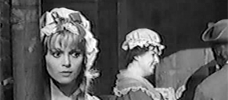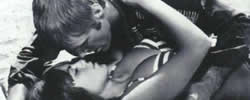Reviews
Russ Meyer
USA, 1971
Credits
Review by Rumsey Taylor
Posted on 07 September 2008
Source bootleg DVD
Categories Bosomania!: The Sex, the Violence, and the Vocabulary of Russ Meyer
By its own merits The Seven Minutes is a boring movie. It dramatizes a court case surrounding a rape that may or may not have been motivated by the book of the title, a description of a woman’s thoughts during the seven minutes it purportedly takes her to reach orgasm. Late in the film, a translator is brought to the courtroom to read passages from the book as objectively and mechanically as possible. This scene, in its determined attempt to deprive what is imaginably a colorful text of any joy, is an efficient summation of The Seven Minutes in its entirety.
This is such an anomalous film for Russ Meyer that perhaps the only complimentary evaluation of it is in considering how it deviates from the hyperactive skin pictures upon which he had heretofore established a career. It was the first of a contracted three-picture deal between Meyer and Fox Pictures, and it followed what was - and remains - his most profitable success, Beyond the Valley of the Dolls. Dolls was very much an extension of Meyer’s aesthetic of excess—lots of women, lots of music, lots of violence. It even had multiple endings. Dolls is a film so comprehensive in the vices it depicts, so distended in its myriad ambitions, that it is natural to think that Meyer’s directorial inclinations would only grow more robust and varied. Certainly, Meyer exhibited the capacity to do so.
Dolls was critically lambasted and yet enormously popular. This discrepancy between critical and popular response was not uncommon to Meyer, who would cater almost exclusively to audiences—the street preacher in Lorna, for example, was a rather transparent attempt to appeal to religious conservatives who had blocked distribution of his prior nudie cuties. Such unpretentious incentives on the part of Meyer are considerable given that they warranted no compromise in his raunchy obsessions—he was somewhat ingenious at sharing certain inclinations with certain audiences. But this approach would falter in The Seven Minutes, a film designed expressly to achieve the sort of repute awarded to a film of radically different pedigree from Meyer’s: a courtroom drama.
The film occurs almost entirely indoors—if this seems a curious observation, know that each of Meyer’s other films feature rural locations of some sparseness, usually the desert. In one of many highlights in Dolls, a newly ambulant character traverses a forest stream, on crutches, and with great effort. There’s Barbados in Black Snake, or Canada in Vixen! There’s an air of freedom, of liberation from the commotion and commodity of urban environs, that permeates a Russ Meyer film. But this is entirely absent from The Seven Minutes, which instead feels restricted, even claustrophobic. Furthermore, it’s a film comprised chiefly of people talking to each other, which would be fine and well had their dialogue been inflected with any carnality or passion—it’s this lack of passion that posits The Seven Minutes as a film at odds with the material essence of a Russ Meyer film. But it should be noted that the film is rendered in Meyer’s characteristic technical precision. There is great variety in camera blocking, and Meyer lends breakneck urgency to certain scenes via imbalanced compositions and a frenzy of edits. The colors are also noticeably pronounced, both the women and automobiles are typically dressed in bold primary colors. In effect, the story’s manner of telling is familiar, even laudable, even if the story itself is unbecoming of its teller.
What the story amounts to is the controversy stemming from a book entitled The Seven Minutes. Selling this book in California results in a misdemeanor, and the opening scene depicts an arrest at an independent bookstore in which the book could be obtained. This arrest is motivated in part by a local faction entitled the Strength Through Decency League, who resist the manufacture and propagation of materials they deem obscene or - worse yet - pornographic. Midway through the film, at one of the group’s rallies, a prosecutor speaks of a necessity to denounce films that contain “rape, lust, motorcycle gangs, homosexuals, lesbians. [and] drug abuse.” Each one of these things has occurred, some repeatedly, in a Russ Meyer film, and it is at this point that it becomes apparent that The Seven Minutes is a platform for Meyer’s stance against the charges of obscenity that greeted virtually each one of his prior films.
Three years earlier saw the release of Meyer’s Vixen!, both his most profitable and most sexually explicit film at the time. The film’s release in Cincinnati was opposed by right-wing lawyer Charles Keating, specifically in his Citizens for Decent Literature anti-pornography organization. His attempted ban failed, as did others against Meyer’s films, but it’s of note that this episode is cited in The Seven Minutes. Late in the film, even, as the defense is building a case against the obscenity charge, a pornographic filmmaker is recommended as a potential witness. The scene in which he’s introduced - in one of the film’s only highlights - he’s seen in a neck scarf and red V-neck sweater, accoutrements that may very well have been obtained from Russ Meyer’s own closet.
The Seven Minutes concludes, after the sort of objection-overrule rhythm that transcribes a television courtroom drama, with a pair of twists and a final verdict. But the outcome is far less interesting than in how the film encapsulates Meyer’s politics, and in a manner demonstrated in no other Russ Meyer film. As such, The Seven Minutes remains an anomaly, but it is not a disingenuous film, and it should not be dismissed. It presents Meyer at his most restrained and political, and he would never direct a film in or of the same fashion again.
More Bosomania!: The Sex, the Violence, and the Vocabulary of Russ Meyer
-

The Immoral Mr. Teas / Eve and the Handyman
1959 / 1961 -

Lorna
1964 -

Fanny Hill
1964 -

Mudhoney
1965 -

Faster, Pussycat! Kill! Kill!
1965 -

Motor Psycho
1965 -

Mondo Topless
1966 -

Common-Law Cabin
1967 -

Good Morning and… Goodbye!
1967 -

Finders Keepers, Lovers Weepers!
1968 -

Vixen!
1968 -

Cherry, Harry & Raquel!
1970 -

Beyond the Valley of the Dolls
1970 -

The Seven Minutes
1971 -

Black Snake
1973 -

Supervixens!
1975 -

Up!
1976 -

Beneath the Valley of the Ultravixens
1979
We don’t do comments anymore, but you may contact us here or find us on Twitter or Facebook.



